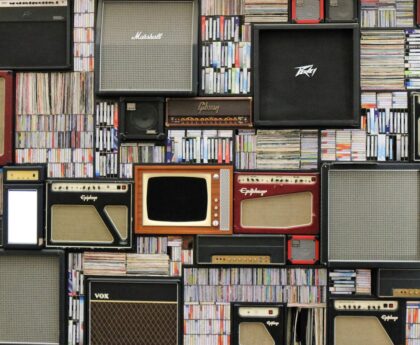Since music is such an integral part of our daily lives, to ask “what is the future of music?” is really to ask a question about ourselves, and how music will continue to shape how we live.
The future of music will most likely follow the same trends we are seeing in modern technology. It will be incredibly social similar to social media, it will become increasingly computer-based and A.I. driven, and lastly, it will serve as a window to the past, held open by any musicians continuing to create music in more traditional ways.
Let’s examine 3 different possibilities for the future of music. Keep in mind that these are of course speculative and in no way absolute.
What might be helpful first, is to briefly take a look at what music is, the intention behind music, and how it relates to technology.
The Beginning of Art and Where it’s Going
The first known painting dates back roughly 40,000 years. It marked the first time we saw our world and wished to interpret it, and then represent it in a new way.
Art has followed that same method ever since. It has always been a way to take our surroundings, and create something that aligned with our perspective.
It truly doesn’t matter what medium, be it painting, sculpting, dancing, photography, film – the intention is the same.
We take our immediate sensation of the world, internalize it, and then manifest it into something new and uniquely human.
What changes during this process is the technology with which we create art, and the way we interpret our surroundings.
As the technology changes, and as we use past art and creations to interpret our world, the art changes and takes new and exciting forms.
How does this relate to music?
Music, being an art form, and sharing that same intention, follows this pattern. Although its purpose or intention remains the same, how it presents itself changes.
For example, imagine trying to create Queen’s operatic masterpiece Bohemian Rhapsody on a phonograph. Would it have been possible? Definitely not. The technology could not have supported what was needed to create it.
Furthermore, could Freddie Mercury have written it without being previously exposed to and inspired by opera? In truth, no he couldn’t have.
With that said, how we express ourselves through art, and the art we create is entirely and irrevocably tangled in both the current state of available technology and past art.
All this to say, that music will almost certainly follow the path of emerging technology and build upon the cultural identities it and other art forms have previously created.
This leads us to the question, what current technology is shaping how we create music?
Music for the Sake of Social Media and Online Communication
Over the past two decades, there has been a shift in how we communicate. Messages that once took personal interaction to convey, can now be made almost instantly, and across almost any distance.
We are the first generation that can communicate anytime, anywhere, without the restraint associated with an immobile communicative device.
For artists, this means that people no longer need to pack into a gallery to see your work. Or huddle around a radio to listen to your music. They can listen anywhere, and anytime, with devices that are becoming increasingly intertwined with their daily lives.




